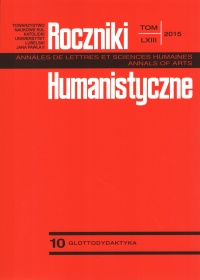Subject-Matter Knowledge for Interpreters and Translators: Educational Implications
Abstract
In the contemporary world the translator and interpreter is expected to be furnished with quality language skills designated by a socio-economic-political domain for which the service has been ordered. The objective of the article is to accentuate the importance of language for specific purposes in educating translators and interpreters for the market needs. Additionally, assuming that language for specific purposes is marked by conceptual differences between languages, we put forth the need for developing professional subject-matter, knowledge-based competence as a prerequisite for quality translation. Thereby, we foresee that the future of translators and interpreters’ education lies in a very narrow specialization, for example, in translating government documents, medical texts, etc. The presupposed hypothesis is verified against the survey research in which practitioners and students articulate their expectations and the shortcomings in their education.
References
Coyle D., Hood Ph., Marsh D.: Content and language integrated learning, Cambridge: Cambridge University Press 2010.
Hasan R.: A view of pragmatics in social semiotic perspective. Seminarium CLSL, wrzesień 2009, http://www.ling.mq.edu.au/clsl/seminars/2009/CLSLseminar_Sept2009.pdf [dostęp: 27.12.2014].
Heron J.: Feeling and personhood: Psychology in another key, Newbury Park, CA: Sage Publications 1992.
Hopper. P.: Emergent grammar, w: The new psychology of language: Cognitive and functional approaches to language structure, red. M. Tomasello, Mahwah, NJ: Erlbaum 1998, s. 155-175.
Järvinen H.M.: What has ecology to do with CLIL? An ecological approach in content and language integrated learning, w: CLIL Practice: Perspectives from the Field, red. D. Marsh, P. Mehisto, D. Wolff, R. Aliaga, T. Asikainen, M. J. Frigols-Martin, S. Hughes, G. Langé, Jyväskylä: CCN: University of Jyväskylä 2009, s. 164-171.
Kennedy C., Bolitho R.: English for specific purposes, London: Macmillan 1990.
Kramsch C.: Introduction. How can we tell the dancer from the dance?, w: Language learning and language socialization. Ecological perspectives, red. C. Kramsch, London–New York: Continuum 2002, s. 1-30.
Kramsch C., Whiteside A.: Language ecology in multilingual settings. Towards a theory of symbolic competence, “Applied Linguistics” 2008, nr 29(4), s. 645-671.
Kubiak B.: Pojęcie języka specjalistycznego, „Języki Obce w Szkole” 2002, nr 5, s. 6-11.
Languaging experiences: learning and teaching revisited, red. H. Lankiewicz, E. Wąsikiewicz-Firlej, Newcastle upon Tyne: Cambridge Scholars Publishing 2014.
Lankiewicz H.: EAP and academic discourse: mediating elaborated code in content learning. „Neofilolog” 2013, nr 41(2), s. 169-185.
Lankiewicz, H. 2014. Reflection built on languaging as an alternative to feedback: developing procedural language awareness of the constructionist nature of knowledge and language among prospective L2 language teachers. „Neofilolog” 2014, nr 43(1), s. 67-80.
Minsky M.: Logical vs. analogical, or symbolic vs. connectionist, or neat vs. scruffy, “AI Magazine” 1991, nr 12(2), s. 34-50.
Moate J.: Reconceptualising the role of talk in CLIL, “Journal of Applied Language Studies” 2011, nr 5 (2), s. 17-35.
Nesi H.: Uncovering occulted genres: A role for corpora in LSP. Prezentacja przedstawiona w ramach 12. Konferencji AELFE (European Association of Languages for Specific Purposes), La Coruña, 5-7 września 2013.
Russell R.R.: Looking beyond the interface: activity theory and distributed learning, w: Distributed learning: social and cultural approaches to practice, red. M. Lea, K. Nicholl, London: Routledge with The Open University 2002, s. 64-82.
Sperber D., Willson D.: Relevance: communication and cognition, Oxford: Blackwell 1986.
Swain M.: Languaging, agency and collaboration in advanced second language proficiency, w: Advanced language learning: the contribution of Halliday and Vygotsky, red. H. Byrnes, New York: Continuum 2006, s. 95-108.
Vygotsky L.S.: Thinking and speech, tłum. N. Minick, w: The collected works of L. S. Vygotsky, vol. I: Problems of general psychology, New York: Plenum Press 1987.
Werbińska D.: Akwizycja języka obcego w perspektywie studenta filologii: Badanie tożsamości narracyjnej studenta w kontekście czasoprzestrzeni i heteroglosii, „Neofilolog” 2012, nr 39(1), s. 55-80.
Copyright (c) 2015 Roczniki Humanistyczne

This work is licensed under a Creative Commons Attribution-NonCommercial-NoDerivatives 4.0 International License.





